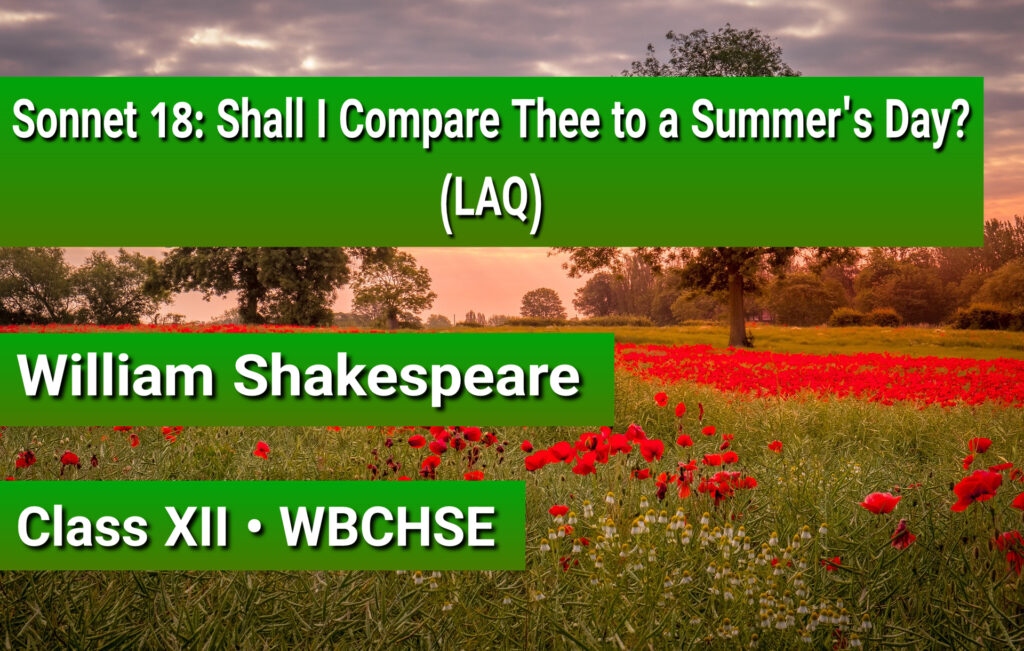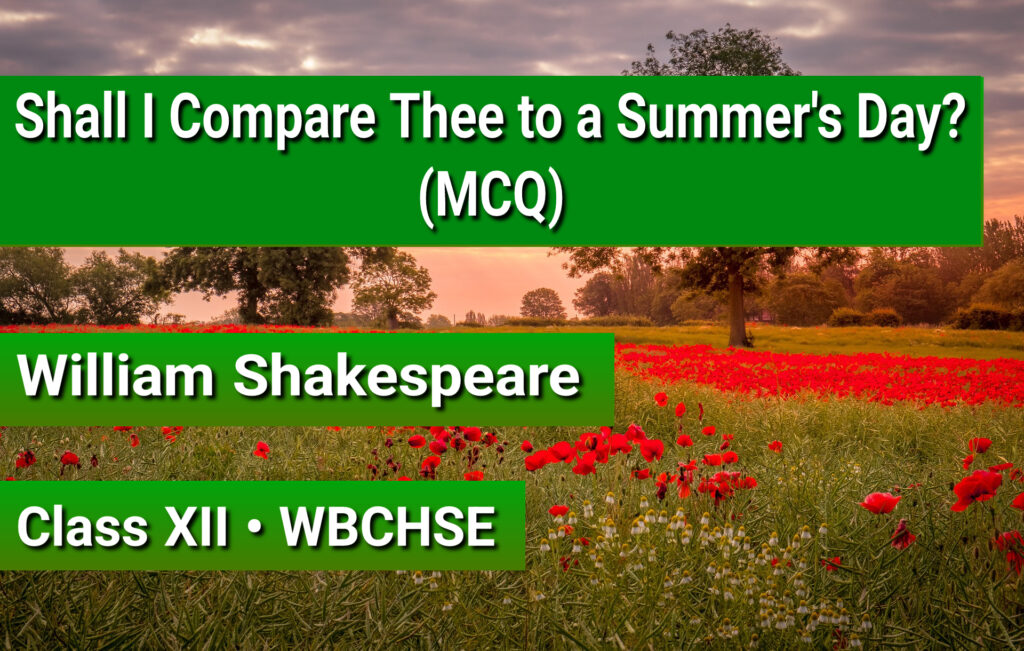Here are some of the important short answer type questions from Sonnet No 18: “Shall I Compare Thee to a Summer’s Day?” by William Shakespeare
Sonnet No 18 – Shall I Compare Thee to a Summer’s Day Short Answer Type Questions

Sonnet No 18 – Shall I Compare Thee to a Summer’s Day SAQ Short Questions and Answers
(1) What kind of poem is ‘Shall I Compare Thee to a Summer’s Day’? [H.S. 2019, 2022]
Ans. ‘Shall I Compare Thee to a Summer’s Day’ is a sonnet.
(2) What type of sonnet is Sonnet No. 18?
Ans. Sonnet No. 18, ‘Shall I Compare Thee to a Summer’s Day?’ is a Shakespearean sonnet having three quatrains and a concluding couplet.
(3) To whom is the sonnet addressed?
Ans. William Shakespeare addressed the sonne to his friend Henry Wriothesly, earl of Southampton.
(4) What is the theme of the poem?
Ans. The theme of the poem is the celebration of the beauty of the poet’s friend.
(5) ‘Shall I compare thee summer’s day?’ – Does the speaker think the comparison proper or worthy?
Ans. No, the speaker does not think the comparison proper or worthy.
(6) How has the friend been described in the first quatrain of Sonnet No. 18?
Ans. The poet’s friend has been described as more lovely and temperate than summer in the first quartrain of Sonnet No. 18.
(7) Why didn’t the poet want to compare his friend to a summer’s day?
Ans. The poet did not want to compare his friend to a summer’s day because his friend is more lovely and more temperate than a summer’s day.
(8) What does ‘eye of heaven’ refer to? [H.S. 2017, 2022]
Ans. In ‘Shall I Compare Thee to a Summer’s Day?’, ‘Eye of heaven’ refers to the sun.
(9) What do the rough winds do in summer?
Ans. Rough winds shake the darling buds of summer.
(10) In which month can the ‘darling buds’ be seen? [H.S. 2020]
Ans. The ‘darling buds’ can be seen in the month of May.
(11) ‘And Summer’s lease hath all too short a date.’ – what is meant by ‘summer’s lease’? [H.S. 2016]
Ans. ‘Summer’s lease’ means the short duration or span of summer.
(12)What are the disadvantages of the summer’s day mentioned in Sonnet No. 18?
Ans. The disadvantages of summer’s day are – summer is short in duration and the winds destroy the darling buds.
(13) How is the complexion of the sun?
Ans. The complexion of sun is golden.
(14) How is the ‘gold complexion’ of the sun dimmed? [H.S. 2016]
Ans. The ‘gold complexion’ of the sun is dimmed because of the clouds.
(15) What does the line “And every fair from fair sometimes decline” mean? [H.S. 2020]
Ans. This means that every object on the earth, however beautiful it may be, is subjected to death and decay.
(16) How does ‘every fair from fair’ decline?
Ans. ‘Every fair from fair’ declines by nature’s changing course.
(17) “And every fair from fair sometimes declines.” – What does the poet mean by two ‘fairs’ in this poem?
Ans. The first ‘fair’ means beautiful objects and the second ‘fair’ means beauty.
(18) What do you mean by the phrase ‘nature’s changing course’?
Ans. The phrase ‘nature’s changing course’ means natural destruction and decay with the progress of time.
(19) “And often his gold complexion deemed” – Whose gold complexion is referred to here?
Ans. The gold complexion of the sun is referred to here.
(20) “But thy eternal summer shall not fade.” – What do you mean by the phrase ‘thy eternal summer’?
Ans. The phrase, ‘thy eternal summer’ means the eternal youth and beauty of the poet’s friend.
(21) What shall death not brag about in Shakespeare’s sonnet No. 18? [H.S. 2015, 2019, 2022]
Ans. In Shakespeare’s Sonnet No. 18, death shall not brag of claiming his friend’s beauty and charm.
(22) “Nor shall death brag thou wand’rest in his shade.” – What does the poet mean to say here?
Ans. By the quoted line the poet means to say that evan death cannot boastfully announce his claim over the poet’s friend.
(23) What will make the beauty of the poet’s friend eternal? [H.S. 2015]
Ans. The immortal lines of the sonnet will make the beauty of the poet’s friend eternal.
(24) “When in eternal lines to time thou grow’st.” – What do you mean by the ‘eternal lines’Ans. The ‘eternal lines’ are the eternal verses in the form of sonnet.
Ans. The ‘eternal lines’ are the immortal verses in the form of sonnet.
(25)”So long as men can breathe or eyes can see” – What does the poet mean by this?
Ans. It suggests the time period as long as human race live on earth and can be able to read poetry.
(26) How long will the young man be remembered in Shakespeare’s sonnet No. 18? [H.S. 2018, 2022]
Ans. The young man will be remembered so long as men can breathe or eyes can see.
OR, The young man will be remembered as long as human race exists on earth.
(27) “So long lives this.” – What is referred to by the word ‘this’? [H.S. 2017]
Ans. ‘This’ refers to the sonnet of Shakespeare.
(28) What gives life to the poet’s friend in sonnet No. 18?
Ans. The sonnet written by William Shakespeare gives life to his friend.
(29) What is the rhyme scheme of Sonnet No. 18?
Ans. The rhyme scheme of Sonnet No. 18 is abab cdcd efef gg.
(30) What does the poet compare his friend to? [H.S. 2023]
Ans. The poet compares his friend to a summer’s day.
Read More:
WBCHSE Class 12 English Chapter Wise Questions and Answers
WBCHSE Class 12 English POETRY Chapter Wise Questions and answers
WBCHSE Class 12 English PROSE Chapter Wise Questions and answers
WBCHSE Class 12 English Drama (The Proposal) Questions and answers
Sonnet No. 18 “Shall I compare Thee to a Summer’s Day?” LAQ Long Questions and Answers



